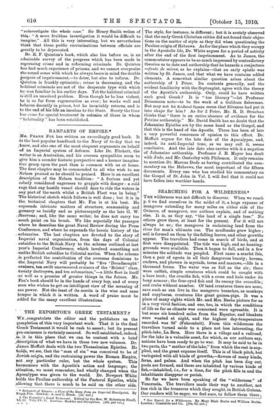THE EXPOSITOR'S GREEK TESTAMENT.e WE ,congratulate the editor and the
publishers on the completion of this very important work. That it is the final Greek Testament it would be rash to assert ; but its present .pre-eminence is tertainly assured. So well established, indeed, is- it in this place that we can be content with a brief ,description of what we have in these two new volumes. Dr. James Moffatt deals with the two Theasalonian Epistles. He holds, we see, that the "man of sin" was conceived to be of Jewish origin, and the restraining power the Roman .Empire, net . any particular ruler, but the whole system. This harmonises with the Apostle's action and language; the eiWatione we must remember, had wholly changed when the Apocalypse was given to the world. Dr. Newport White holds the Pauline authorship of the Pastoral Epistles, while ,allowieg that there is much to be said on the other side.
RaMparts of Empire a View, of the Natty from an Imperial Standpoint. By Fr4.4 Pox.- London: A. and C. Black. [5s. net.] t Tat Expasitor's Greek Testament. Edited by the Rev. W. Robertson Nicoll, LL:113; Vols. IV.-Y; London; fodder and Stoughton. [28s. per vol.] 4. A, • The style, for instance, is different ; but it is acutely observed that the early Greek Christian critics did not found their objece tions on the matter of style as they did when questioning the Pauline origin of Hebrews. As for the place which they occupy in the Aposeolic life, Dr. White argues for a period of activity after the end of the first imprisonment. As to James, the commentator appears to be so much impressed by contradictory theories as to. date and authorship that he hazards a conjecture —fasts .de mieux, as he explains—that an early epistle was written by St. James, and that what we have contains added elements. A somewhat similar question arises about the authorship of 1 Peter. Its contents generally, and the evident familiarity with the Septuagint, agree with the theory of the Apostle's authorship. Only, could he have written such good Greek ? It is "too literary "—let Professor Deissmann note.—to be the work of a Galilean fisherman. But may not &a ZIA/3cumi; typeupa mean that Savant's had put it into shape for him ? As for 2 Peter, Mr. R. D. Strachan thinks that "there is an entire absence of evidence for the Petrine authorship." Mr. David Smith has no doubt that the Johannine Epistles are by the same hand as the Gospel, and that this is the hand of the Apostle. Them has been of late a very powerful consensus of opinion to this effect. Dr. Moffatt argues for the late date of the Apocalypse, and, indeed, its anti-Imperial tone, as we may call it, seems conclusive. And the late date also carries with it a negation of Johannine authorship. Professor J. B. Mayor has dealt with Jude, and Mr. Oesterley with Philemon. It only remains to mention Dr. Marcus Dods as having contributed the com- mentary on the Hebrews, the most important of the fifteen documents. Every one who has studied his commentary on the Gospel of St. John in Vol. L will feel that it could not have fallen into worthier hands.














































 Previous page
Previous page